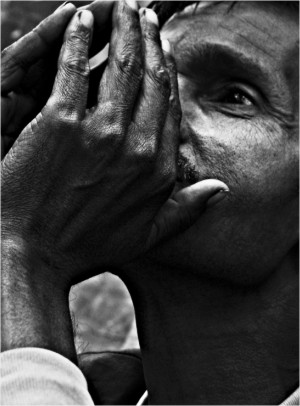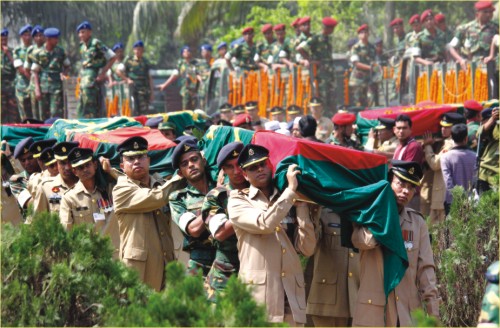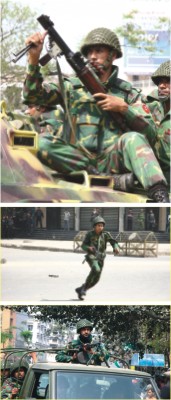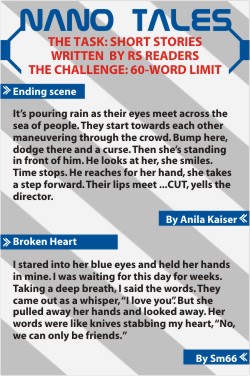
By Sabrina F Ahmad
February 25th, 2009, 9:00 am
It started as a pretty ordinary morning for most of us. The shops were opening up, the
 Photo: Shabnaz Rashid Diya
Photo: Shabnaz Rashid Diya |
offices were just starting operations, and Dhaka was gearing up for another working day. No one could have predicted that in a few hours, life here would never be the same again.
On Wednesday last, thousands of soldiers from the paramilitary Bangladesh Rifles (BDR) staged a revolt against their army officers and their families, in what is probably the bloodiest incident in the recent history of Bangladesh, or any military history (according to the BBC) since World War II, for that matter.
The mutineers stormed into Darbar Hall, shooting at their officers and captured the BDR Headquarters at Pilkhana. Responding to the emergency, the army deployed forces to Dhanmondi to quell the violence. Residents of Dhanmondi and passers-by would later recollect horrifying scenes of helicopters flying overhead and the staccato of gunfire. A few civilians even got hit in the crossfire when the BDR jawans began shooting at them. By noon, all the academic institutions were closed, the students and teachers evacuated, and everyone was glued to their television sets, watching speechless as the horror unfolded.
9:00 pm
The tension bumped up a notch when tanks were brought in to tackle the heavy weaponry being used by the aggressors from inside the BDR. Earlier in the evening, everyone living within a 2-mile radius of Pilkhana was asked to evacuate from the houses, as a precaution against the heavy artillery. Those who were able to quickly made for the safety of relatives' houses, while others found themselves trapped in a nightmare situation. Once such person was Sabhanaz Rashid Diya, who shares her experiences with us:"It has been almost 4 hours since we've kept the lights at our home down. There is no sound outside - an ironical piece of reality given the fact there are at least 30 army tanks, artillery and hundreds of army troop outside.
We decided to leave; but were stopped by another army soldier who told us they would start an air raid any moment and if we fall into it, then they wouldn't be able to do anything. We were trapped, and soon, realized were one of the two families that were still in the apartment. The lights are switched off and the TV murmurs whatever “breaking news” the world has to offer. Cell phone networks are down. There have been rumours of a possible air raid, of tanks breaking into the Quarters and of a crackdown. We don't know what to believe or who to trust.
The channels repeat old stories and by now, we have them memorized. We are too afraid to make any noise as we listen to the occasional, sudden gunshots nearby.”
Initially, the reports stated that the BDR forces were fighting to protest poor working conditions, deprivation of rights, and other injustices they suffered as a result of corruption within the army. Although many felt that taking up arms against their superiors was an extreme reaction, the jawans still had the crowd support.
Until reports of the massacre inside the HQ's began to trickle forth, when the public reacted with dismay. Kazim Ibne Sadique writes:
"Ever since I was a student of RPSC during my primary school years, I've nursed a soft corner for the BDR. To me, they seemed like a down-to-earth, hard-working bunch; not as complex as the army, not as redundant as the police. They were my favourite defense force, keeping our borders safe, taking bullets for the country. So when news of their coup reached me as well as the reason, I thought they were justified. Like most people, I thought they would just take the officers hostage and present their demands. Protesting doesn't come easily to armed forces, thus such drastic measures. How wrong I was! The news started coming in slowly. Rumours started gaining momentum and becoming the truth. And the BDR's fall from grace was only the beginning. What they have done was horrendous. Actually, any word in my vocabulary won't be able to express it. Such actions were so far beyond the line that it is doubtful they knew a line ever existed.

SK. ENAMUL HAQUE
In the beginning of the situation, I was trying to cool the heads of my pro-BDR friends who were fanatically supporting BDR. At the end of it, I was one of the few people who were the voices of moderation among a tide of people who'd made a turn around and were crying for blood. It's not easy being calm when you lose people you know, like I have."
Indeed, the Internet came alive with notes, comments, news posts, as everyone with access reacted to the attack. For those of us in Dhaka, living in other areas, living the nightmare through our television screens and computer monitors, it was bad enough; for those following the events from abroad, there was a sense of unreality and disbelief attached to, but undoubtedly, for those who had loved ones trapped inside Pilkhana, it

Zahedul I Khan |
was nothing short of hell. With unstable networks and the ghoulish massacre happening inside, news came in short bursts, through farewell text messages and desperate calls for help. Frantic family members waited in vain for some sort of release. Azfarul Islam, currently studying in the UK, had this to say: “I only heard about the situation after the first day; getting notified in a chat and then reading about it felt unbelievable, almost surreal. Although, I think for those of us not in the country, it's a far scarier thing.”
The revolt came to an end on Thursday evening after a series of negotiations between the mutinous soldiers and government officials, but the nightmare had only begun to unravel for the rest of us. When the investigators and rescue workers entered the war zone, the truth of the events of the weekend began to emerge. Corpses, not only of the soldiers, but also the people living in the residential area within Pilkhana, began to emerge. Living, breathing people, had been rendered into statistics in a long list of casualties.
It is without a doubt a huge blow to the nation. We've lost some brilliant officers, and our national defense has certainly taken a hit. For the families, however, the loss is even more personal. Hammad Ali says:
"Lt. Colonel Enshad Ibn Amin, Robin Mama to us, loved everyone. When we heard of his death, his family cried. His friends cried. But so did the guards in our apartments, the drivers, and the maids. They all loved him so much, because he loved them all so much. I cannot remember a single time I heard him say a bad thing to someone, but that was easy for him. What surprises me is that even in death, not a single person said a bad thing about him. We loved him a lot, but Allah loves him a lot more. We just wish the world was not deprived of him this way."
As more news continues to pour, each uncovered truth is like another fresh wound. The question of 'Why did this happen?' hangs ominously in the air. With each passing day, there is a feeling of anger, of bitterness. Stories of inhuman brutality and of fatal errors that have lead to unnecessary deaths and worst of all, of conspiracy theories are poisoning minds near and far. For most of us, we can only helplessly wonder: “What can we do? Where can we go from here?” More than ever, it is truly a time to come together. It is a time to remain strong and support those who have lost so much. It is a time to refrain from idle speculation and finger-pointing, for it is such activities that break the spirit. The brave men we lost in that dark, dark weekend would not want us to lose hope for they were more than just defenders of a nation. As Diya said of the event: “All we have with us are prayers, and we patiently wait for the sun to dawn upon us.”
Rising Stars offers its deepest condolences to the families of those that lost their lives in the events of February 25-26.

